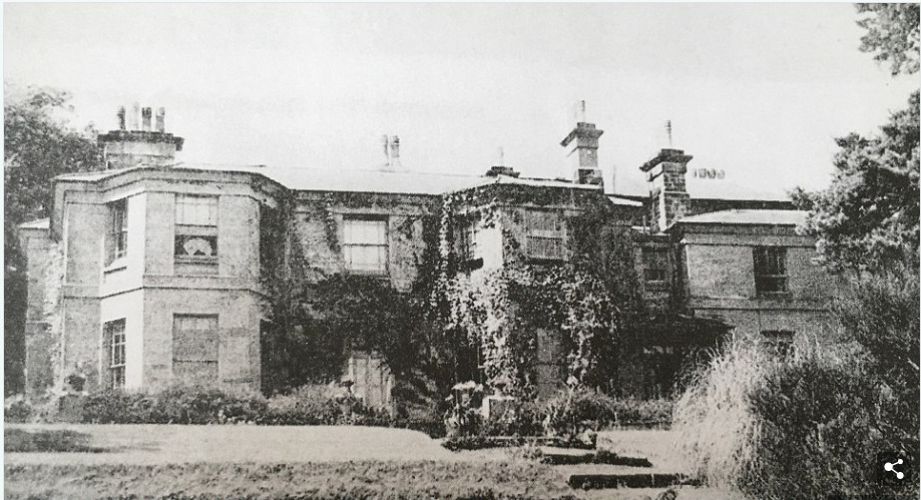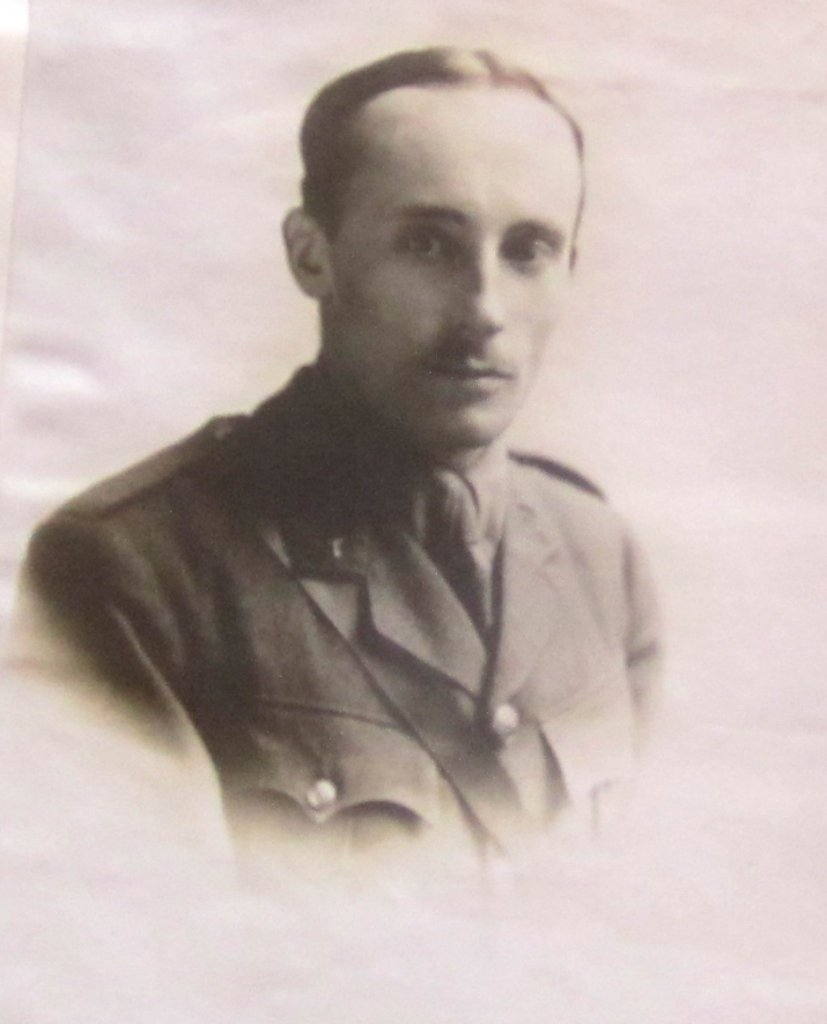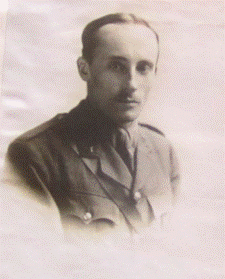Fact file:
Matriculated: 1910
Born: 24 April 1891
Died: 28 July 1917
Regiment: Kent Cyclist Battalian
Grave/Memorial: Dickebusch (Dikkebus) New Military Cemetery (Extension): 2.F.22
Family background
b. 24 April 1891 at The Manor House, Speldhurst, Tunbridge Wells, as the younger son of Charles Watson Powell, JP, DL (1852–1937), and Elizabeth Constance Powell (née Drury) (1866–1961) (m. 1888). At the time of both the 1901 and 1911 Censuses, the family was still living at the manor in Speldhurst, where in 1901 they employed five servants and in 1911 four servants, including in both years a butler.
Parents and antecedents
Powell’s paternal great-grandfather was Baden Powell (1767–1844) who was a wine merchant, one-time Sheriff of Kent, and a conservative High Churchman, a member of the Hackney Phalanx. He had three sons, Baden Powell (1796–1860), a liberal clergyman and a scientist of note, who was elected to the Royal Society in 1824 and was made Savilian Professor of Geometry at Oxford in 1827. This younger Baden Powell was an opponent of Newman and the Tractarians, denied miracles, and enthused over Darwin, but is probably best known today as the father of Lord Baden-Powell (1857–1941), the founder of the Scouting movement. Charles Powell (1807–85) (our Powell’s grandfather) graduated from Trinity College Oxford in 1829; he lived in Speldhurst and was a JP for Kent. He was master of the Mercers’ Company in 1853 and 1882. He married Emily Ann Watson (1824–1890) in 1851. And Henry Powell (1809–67), the youngest brother, was a surgeon.
His other paternal great-grandfather was James Eyre Watson JP (1785–1853) of Fillongley Grange, Warwickshire.

The Manor House, Speldhurst, built by Charles Watson Powell
Although Powell’s father was a qualified barrister of the Inner Temple and a medallist of the London Academy of Music, he was also the Lord of the Manor of Speldhurst and Hollands in Kent and a keen member of the Volunteers (Territorial Force), and he seems to have spent most of his time living the life of a landowner and country gentleman. But in February 1894, following the death of James Harrison, a neighbour, in late 1891, he was involved in a complicated court case with the Harrisons’ heirs over his right, as feudal Lord of the Manor, to seize “heriot”, a form of local death duty in kind that originated in Anglo-Saxon times, from a serf or villein. The judge ruled that although Powell’s father had the customary right to seize heriot, he had seized too much – two horses and a cow instead of just two horses – so gave judgement for the plaintiffs but without costs. Charles Watson was also prominent in the public life of Kent and the Chairman of the Tonbridge Bench and the Land Tax Commissioners for Tonbridge and Tunbridge Wells. Moreover, when St Paul’s Girls’ School, London, was founded in 1903 – it was officially opened on 15 April 1904 – Charles Watson was a very conscientious Governor from 1903 to May 1907 – he missed almost no meetings during his term of office – and became Chairman of the Governors in 1907. This means that for two years (1903–October 1905) Charles Watson overlapped as a Governor with Magdalen’s President Warren, another original Governor of St Paul’s Girls’ School, which may explain why his second son went to Magdalen rather than Merton, Charles Watson’s old Oxford college. From 1906 to 1907, Charles Watson was also Master of the Mercers’ Company.
One of Powell’s maternal great-grandfathers was Henry Joseph Thomas Drury (1778–1841) for 40 years a master at Harrow School and one-time tutor and later friend of Lord Byron.

Henry Joseph Thomas Drury
by Thomas Hodgetts, after Margaret Sarah Carpenter
mezzotint, (1828)
NPG D35588
© National Portrait Gallery, London
His maternal grandfather was Colonel Heber Drury (1819–1905), a retired officer of the Madras Light Infantry (Indian Army), who was stationed in Travancore, Southern India. Colonel Drury was a noted botanist, and his name is contained in the scientific designation of the extremely rare orchid that is found only in the Himalayas and the Western Ghats and is known colloquially as the ‘Lost Orchid’ and scientifically as the Paphiopedilum druryi. He was the author of Handbook of the Indian Flora (three volumes, 1869) and The Useful Plants of India: With Notices of their Chief Value in Commerce, Medicine, and the Arts (1873). As an adjunct to Drury’s study, a school of botanical painting developed in Southern India, and his autobiography, Reminiscences of Life and Sport in Southern India, was published by W.H. Allen & Co. in 1890.
Powell was not related to Maurice Powell, and only distantly related to Edward Powell through their great-great-grandfather David Powell (1695–1784).
Siblings and their families
Powell had a brother, Charles Baden Drury (1889–1916), who was killed in action on 14 August 1916 at High Wood, on the Somme, while serving as a Private in the 21st Battalion, the Middlesex Regiment).
Charles Baden was educated at Bedales School, Petersfield, Hampshire, and Wye Agricultural College, Herefordshire. But he intended to become a professional actor and thereafter trained in the School of Dramatic Art.
Education
Powell was educated at The Grange Preparatory School, Crowborough, Kent, from 1899 to 1904, at St Wilfrid’s Preparatory School, Bexhill-on-Sea, Sussex, from 1904 to 1906, and at Harrow School from 1906 to 1910, where he captained his House’s cricket team. He matriculated at Magdalen as a Commoner on 18 October 1910, having passed Responsions in Hilary Term 1910. He failed one part of the First Public Examination (Greek and Latin Literature) in Hilary Term 1911, but re-sat it successfully in Trinity Term 1911, and he passed the other part (Holy Scripture) in October 1911. He then began to read for a Pass Degree and passed Group B3 (Elements of Political Economy) in Michaelmas Term 1912. But he failed B2 (French Language) in Trinity Term 1913 and did not pass it until Trinity Term 1914. He also failed Group B1 (English History) in Michaelmas Term 1913 and never re-sat it so left without a degree in summer 1914. But under War Decree (1) of 8 February 1916 he was excused from passing any further examinations, and was able to take his BA in absentia on 29 June 1916. After leaving Oxford, Powell studied Law as a member of the Inner Temple, which he had joined in 1912, and by the outbreak of war he had passed Roman Law and Jurisprudence with a third-class mark. After his death, President Warren said of him:
If somewhat quiet, he had plenty of character and ability, and was a golfer and a cricketer. [He] was specially attached to his College, and some time after he had joined his Regiment [he] sent spontaneously a cheque for the College Mission.

Gerald Frederick Watson Powell
(from Magdalen College Group photograph 1912)
Military and war service
On 16 March 1911, i.e. while still an undergraduate at Magdalen and at 5 foot 8 inches tall, Powell successfully applied for a Territorial Commission either in the 1/1st (Kent) Cyclist Battalion (Territorial Force), or in the 9th or the 2/1st (Kent) Cyclist Battalions (TF), all part of the Army’s Cyclist Corps (London Gazette, no. 28,488, 25 April 1911, p. 3,171). He was promoted Lieutenant on 20 November 1912 (LG, no. 28,672, 17 December 1912, p. 9,582) and Captain on 17 July 1914 (LG, no. 28,860, 4 August 1914, p. 6,078), and when war broke out he was an officer in the 1/1st (Kent) Cyclist Battalion (TF), part of the 57th Division that was used for the defence of the Kent and Sussex coastline. But it was then reorganized as an infantry battalion and on 8 February 1916 it left for India, where it spent the rest of the war. As Powell did not want to go to India but to serve on the Western Front, he was transferred to the Queen’s Own Royal West Kent Regiment in March 1916.

Gerald Frederick Watson Powell
(Courtesy Magdalen College)
On 13 March 1917 he was promoted Major (LG, no. 30,181, 13 July 1917, p. 7,062) and he finally disembarked in France on 2 May 1917, where, on 12 May 1917, he was attached to the Regiment’s 8th (Service) Battalion that had been serving on the Continent since 30 August 1915 as part of 72nd Brigade, 24th Division. The War Diary is missing for May 1917, but during this month the Battalion was well away from the front line, in billets first at Ligny-lès-Aire, about 25 miles west-north-west of Béthune, and then at Delettes, about 13 miles south of St-Omer. By early June, the Battalion had moved intro south-western Belgium between Abeele, south of Poperinghe and straddling the Franco-Belgian border, and Hopoutre, a railhead near Poperinghe whose name, a corruption of “Hop Out Here”, was probably invented by British soldiers. From there it moved northwards until, by 9 June, it was in the trenches near Dickebusch (Dikkebus). On 30 June 1917 the 8th Battalion withdrew from the line in order to rest near Seninghem and Lumbres, abut ten miles south-west of St Omer, and it returned to the front line on 22 July.
Powell was killed in action by a shell, aged 26, on 28 July 1917 at Hill 60, when he was off duty and had gone out to help a wounded man. Hill 60 also claimed the lives of A.H. Huth, T.E.G. Norton, G.U. Robins and R.H.P. Howard. He is buried in Dickebusch (Dikkebus) New Military Cemetery (Extension), Grave 2.F.22. The inscription reads: “Life’s work well done, now cometh rest” and “Goodnight beloved, not farewell”. The first quotation comes from ‘Funeral Ode on James A. Garfield’ (1881) by the American poet Edward Hazen Parker, MD (1823–96) – James A. Garfield (1831–81) was the twentieth President of the USA and was assassinated on 2 July 1881; the second quotation is from line 21 of ‘The Christian’s Goodnight’ by Sarah Doundney (1841–1926). Powell and his brother Charles, who is buried in Maroc British Cemetery, Grenay, south of Béthune, Grave I.G.20, are commemorated on the civic war memorial at Speldhurst, Kent, and on Harrow’s Great War Roll of Honour. Powell left £11,739 15s 0d.

Dickebusch (Dikkebus) New Military Cemy (Extension); Grave 2.F.22.
Bibliography
For the books and archives referred to here in short form, refer to the Slow Dusk Bibliography and Archival Sources.
Printed sources:
[Anon.], ‘Law Report’, The Times, no. 34,186 (13 February 1894), p. 13.
[Anon.], ‘Major Gerald Frederick Watson Powell’ [obituary], The Times, no. 41,552 (9 August 1917), p. 2.
[Thomas Herbert Warren], ‘Oxford’s Sacrifice’ [obituary], The Oxford Magazine, 36, no. 1 (19 October 1917), p. 9.
Harrow Memorials, v (1920), unpaginated.
[Anon.], ‘Mr C.W. Powell’ [obituary], The Times, no. 47,609 (15 February 1937), p. 14.
Archival sources:
OUA: UR 2/1/73.
WO95/2213.
WO95/5455.
WO374/54910.
